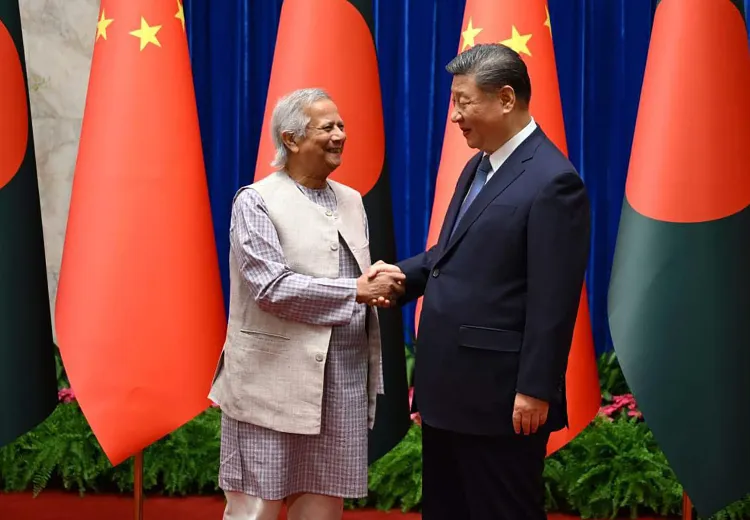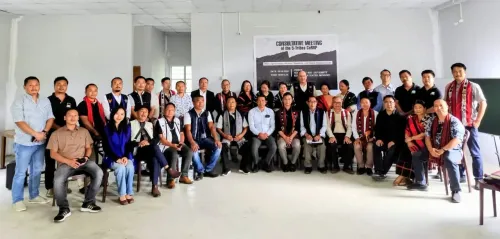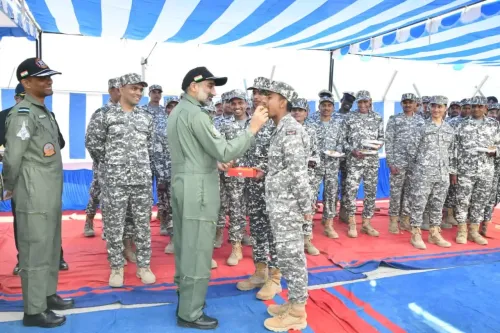Is the China-Pakistan-Bangladesh Axis a New Challenge in the Subcontinent?

Synopsis
Key Takeaways
- Inaugural trilateral meeting among Bangladesh, China, and Pakistan held in Kunming.
- Commitment to regional cooperation across various fields.
- Potential challenges for India due to this emerging alliance.
- Focus on enhancing trade and investment opportunities.
- Historical context of strained Bangladesh-Pakistan relations shifting under Yunus's leadership.
New Delhi: In a significant development indicating the growing collaboration among Bangladesh, China, and Pakistan, the inaugural trilateral meeting took place in Kunming, located in China’s southern Yunnan province, on June 19. During this meeting, representatives from all three nations expressed their dedication to a “shared” future.
The countries engaged in extensive dialogues on enhancing trilateral cooperation, agreeing to advance based on the principles of good neighbourliness, mutual trust, equality, openness, inclusiveness, and shared development. The Chinese Foreign Ministry emphasized their commitment to true multilateralism and open regionalism, clarifying that it is not aimed at any third nation.
During the discussions, the three nations also concurred on the necessity of enhancing regional connectivity and broadening collaboration across various fields such as trade, investment, agriculture, digital economy, environmental protection, marine sciences, green infrastructure, culture, education, and people-to-people exchanges.
The first phase of the meeting saw Pakistani Foreign Secretary Amna Baloch participating virtually.
There are indications that influential pro-China and anti-India groups in both Bangladesh and Pakistan have been actively seeking closer military ties with China for acquiring additional Chinese defense equipment.
On Sunday, at the behest of the ruling Communist Party of China (CPC), a high-level delegation consisting of ten members from the Bangladesh Nationalist Party (BNP), led by BNP Secretary General Mirza Fakhrul Islam Alamgir, arrived in China. This visit is part of the BNP’s strategic initiative to strengthen its political and diplomatic ties with the Chinese government and the CPC. In May 2025, a BNP delegation also attended an international political conference in Beijing organized by the CPC, engaging in discussions with political representatives from various regions.
Previously, from February 24 to March 6, a joint delegation of 21 representatives from eight political parties, including BNP, visited China, led by Abdul Moyeen Khan from BNP’s National Standing Committee.
Bangladesh’s increasing engagement with China and Pakistan under the interim administration of Muhammad Yunus has become particularly evident since the removal of former Prime Minister Sheikh Hasina in August 2024.
Recently, Major General (Retd.) Rezzakul Haider Chowdhury, a former Director General of Foreign Intelligence with a controversial past, reportedly completed a 12-day visit to Guangzhou on June 18, leading to speculation regarding his ongoing involvement in activities against India which are allegedly supported by Bangladesh’s interim government.
Reports suggest that another prominent figure linked to the April 2004 Chittagong arms smuggling case, the self-exiled ULFA chief Paresh Barua, has also relocated to Xishuangbanna Dai Autonomous Prefecture in Yunnan province, which borders Myanmar and Laos.
Furthermore, it has been revealed that Khalilur Rahman, Bangladesh’s interim National Security Advisor, recently met with the Chinese Ambassador in Dhaka, requesting a meeting with the Director General of Pakistan’s ISI in Beijing.
Interestingly, the Kunming trilateral meeting coincided with Rahman’s visit to Washington and his discussions with senior US officials.
For many years, relations between Dhaka and Islamabad have been tense and unfriendly. However, under Yunus’s leadership, there seems to be a promising shift in the Bangladesh-Pakistan relationship. Analysts contend that Pakistan is capitalizing on the situation by positioning its non-state actors within Bangladesh, integrating them with Rohingya refugees and collaborating with radical Islamist groups to promote anti-India sentiments.
It can be posited that in alignment with China’s broader regional interests, both Bangladesh and Pakistan are willing to compromise their own sovereignty, decision-making, resources, and markets.
Meanwhile, the China-Pakistan Economic Corridor (CPEC) continues to undermine Pakistan’s industrial strategy, leading to significant dependencies on China and threatening Pakistan’s economic future.
(The author is a specialist in South Asia and Eurasia. Previously associated with the Manohar Parrikar Institute for Defence Studies and Analyses. The views expressed are personal)









